Established 2023
Believers in God - How Eastern State Inmates Pursued their Christian Beliefs and Served God During the Time of War
Monday, November 11, 2024
Daniel Cho
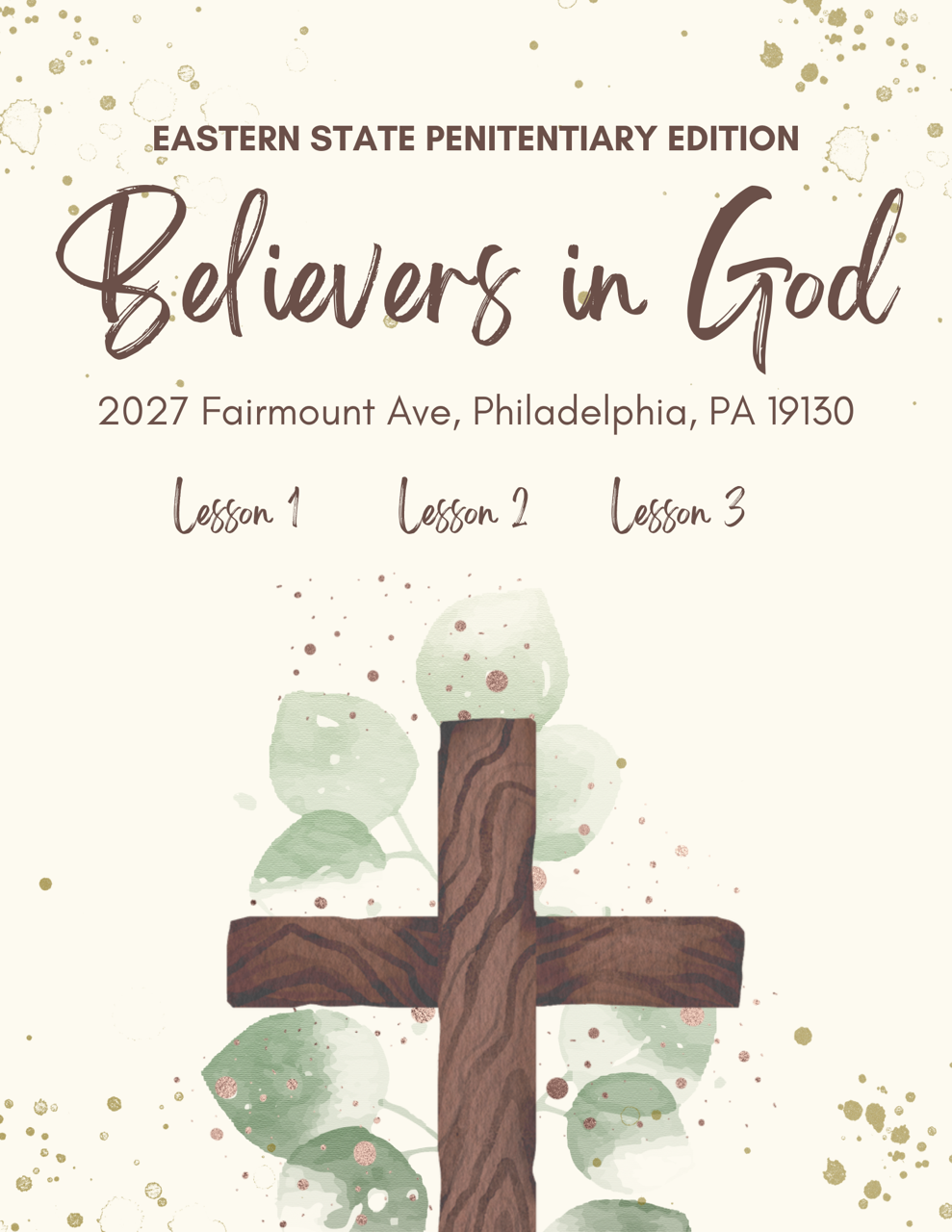
Background Information
Christian inmates in the Eastern State Penitentiary, located in Philadelphia, Pennsylvania, just like any other Christians living all around the world, practiced and pursued their faith within the prison facilities. During the chaotic years of 1916-1917, nearing the end of World War I, Christian inmates prayed to Lord the Savior for the preservation of mankind and urged for patriotism, as well as praying for the renewal of their lives and repentance for their previous wrongdoings. Countless Christians in the Penitentiary wrote prayers, confessed to their faiths and beliefs, and held gatherings spearheaded by well-known priests in the local Philadelphia community.
Lesson #1: Praying for Repentence
Let us begin with the Prayer from Elizabeth Stuart Phelps:
Be Born Again (1917) By Elizabeth Stuart Phelps
Be born anew, dear Lord, be born again, Unto the hunger of the sons of men! Whose famine is too bitter to be fed By any lower food than sacred bread. We thirst for hope and, tasting, drink it not. We choke for joy denied a barren lot. We starve for love and, starving, throw the dice That may, or may not, pay love’s precious price. Our trembling hands, infirm, have lost the wit To grasp Thy holy cup. Lord, give us it! Fill it with strength despaired of by the weak.
Fill it with brimming rest the weary seek. Out of the chalice let the lonely drink. Restrain the wild soul crouching on the brink Of shameful purposes, that no man knows. Watch, Thou, the desert where the desperate goes! Unto white hearts give purity anew; And to the false the power to be true. Grant to the mourning, all uncomforted, The conscious coming of their dearest dead. Give to the friendless, shrinking and apart The happy throbbing of the Christmas heart.
Be born again, dear Christ! be born again, Unto the knowledge of the sons of men. Be born into the gentle heart that brings Its best, its strongest to the weakest things. Be born into the finest tenderness That will not burden, where it cannot bless; Be born in the divinest power to feel, That never hurts the nerve it cannot heal.
This prayer was written in the Christmas day of 1917 by inmate Elizabeth Stuart Phelps, who was praying for the "hunger of the sons of men" indicating the soldiers who are fighting the cold winters in the European battlefront. She also professed to God to forgive her sins and make her "born anew." For Christmas, she asked God to fill "the weak" inmates with much needed strength, hope, and friendliness. Being in a prison during a festive season might have weakened the inmates' souls but Phelps prayed to be reborn in the "diviniest power" to feel and to heal their wounds.
Let us move onto how inmate B7291 Joseph Y. Russell professes to his fellow male inmates, asking them to forgive each other's trespasses:
FORGIVE US OUR TRESPASSES (1916) By Joseph Y. Russell
It is said that there is no quarter of the globe, where mankind dwells, where the lord's Prayer is not known, or has not been heard. People of every rank and condition say it, if they pray at all, from the smallest child going to Sunday school, to men and women whose seamed features and snowy locks denote the weight of many years. The question is, how much real spirit goes with it, with some of them? Do people fully realize or mean just what they say? Now the important part to which I refer, is, "Forgive US OUR trespasses; AS WE forgive THEM that trespass AGAINST US." We are asking God to forgive US as WE forgive OTHERS, in the same way, in the same measure. Pause and ask yourself; am I forgiven? How many men in this institution are every day begging for, and expecting, mercy to be shown them? Some are asking the Warden, some are asking or writing to Mr. Horstman or the Parole Board. Others financially are employing attorneys to present their cases to the Board of Pardons. It is true, no doubt, that they are all sincerely repentant and ready and willing to begin a new life and do right, if given the opportunity. But do they, do you, or do I show the same spirit of forgiveness and mercy towards our brother that we expect from others? The minute someone offends us by some word or deed, real or imaginary, we fly into a rage, abuse him, condemn him or ostracize him. Boys! we cannot all be alike, or think alike; and we all make mistakes so forgive, with an open heart, the mistakes or offenses of the other fellow and you will indeed be forgiven your trespasses, as we forgive them that trespass against us. Think it over comrades.
Joseph Y. Russell was sentenced for the first time in September of 1914 for sodomy, or committing sexual intercourse involving anal or oral copulation. He quotes the Lord's Prayer: forgive us our trespasses as we forgive those who trespass against us. Russell was disdained by the fact that people in the penitentiary do not show the "same spirit of forgiveness or mercy" towards each other. Russell uses the terms brother and comrades to encourage his fellow inmates to not fly into a rage, abuse others, nor condemn others due to a simple mistake. There is no human being that does not commit some sort of mistakes or trespasses. What Russell strived to profess is that it is crucial to have an open heart to understand and forgive others. Below is a record of Russell when he was received at the age of 41. As a resident of Dauphin, Pennsylvania, he was released after four years of prison life.
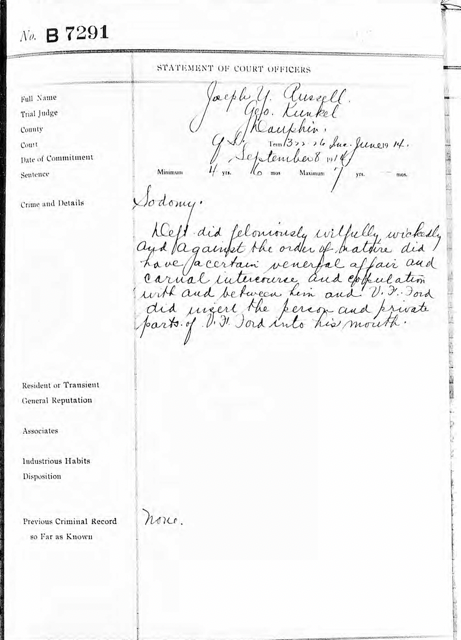
As seen from two different confessions of faith from Phelps and Russell, inmates, whether in solitude or as a group, professed to God and one another to practice the virtues of mercy, forgiveness, and graciousness.
Lesson #2: How Influential Religious Leaders Gathered and United Inmates
The Rev. Father H. A. Deckenbrock was a well-renownded priest who devoted forty years of life to service to his parish at Clarion, Pennsylvania. Deckenbrock, who was most favorably known throughout the western part of this state as a gifted and scholarly priest, and inmates recalled him as a man loved for his fullness of heart and devotion to faith. He was born in Westphalia, Germany, in 1848, where he was ordained as priest, and moved to the United States shortly thereafter. He was stationed at Erie, and later at Meadville, Pennsylvania. After all his service, he passed away in April of 1916. Deckenbrock strived to inform people of “Voice of One Crying in the Wilderness”, especially in Clarion, Pennsylvania. He helped build the Immaculate Conception Parish in the neighborhood, as seen in picture below. The will of Father Deckenbrock written within the year of his passing is also shown below, which highlights his utmost gratitude for the Clarion community but his also the opportunity for him to teach God's gospel to people of Pennsylvania.
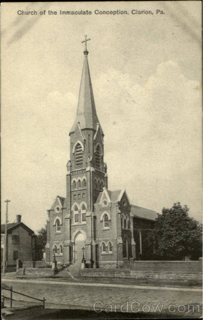
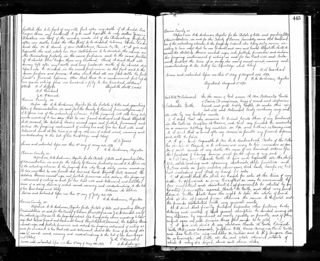
Though not much was known about the specifics of Father Deckenbrock's lessons in the Eastern State Penitentiary, we know that religious gatherings were held weekly within the Eastern State Penitentiary. In the excerpt from The Umpire in 1916 Volume 5, Issue 16, we can find out that not only Christian gatherings but also Catholic masses and Jewish services were held in large scale rooms in the Penitentiary.
RELIGIOUS SERVICES
Catholic Mass is celebrated at the Prison Chapel every Sunday at 7.30 o’clock, A. M. Confession every Saturday morning. General services are held on the various Blocks at 9 o’clock every Sunday morning. Episcopal services are held at the Chapel on the third Thursday of every month. Jewish services are held on Saturdays at the band-room.
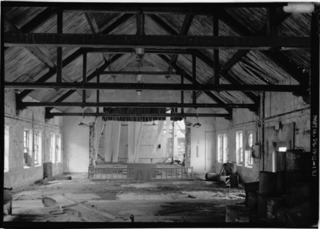
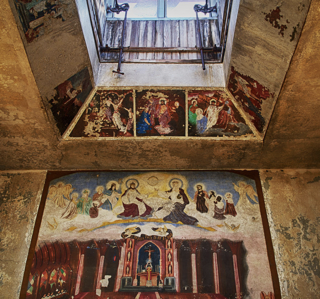
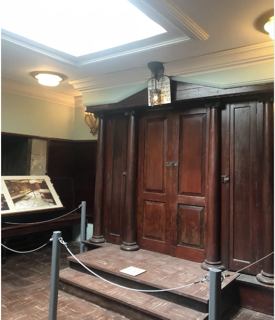
The first two photos on the top are chapels used for Catholic masses, Confessions, and Episcopal services, while the photo at the bottom is a mini-scaled synagogue for Jewish services. The Umpire also highlights that the Episcopal service every month highlights the Rev. Thomas J. Taylor, assisted by the Rev. H. M. Peck, conducting the service. An edifying sermon was addressed to the inmates with the purport of inducing a higher ideal of life and a desire for moral betterment. The services were well-attended and communion was administered to sixty-four or less inmate members of the church. The choir existed and did well in song, showing improvement day after day. In the afternoons, Baptismal services were conducted by the Rev. T. J. Taylor, at which time sixteen inmates at a time were baptized. Chaplain Joseph Welch, Mrs. Keen, Mrs. Connoly and a number of religious scholars and priests were present at the services as a rotation. It is very surprising that Holy Communion were conducted regularly, as it is a signal of blessing and a new beginning for inmates. The Rev. T. J. Taylor and the Rev. Dr. Perry, of Germantown, were the most prominent and often-mentioned figures who visited the Eastern State Penitentiary often and preached with passion, clear and earnest sermon from the text, including "He is able to save the uttermost all who come unto God by Him."
Lesson #3: How Religion Spurred Patriotism in the Penitentiary
We all know that the time period 1916-1917 were troubled years for both inmates and Americans fighting in World War I battlefronts across the Atlantic. The war broke out in 1914 in Europe, and the Americans entered the war in 1917. The Umpire reported that the inmates financed the purchase of an ambulance for the Red Cross, as well as noting that female inmates at Eastern State donated $5 towards the war effort, given that the average inmate during the time of war were earning $8 a month. Additionally, inmates produced games (one was called "Go-Bang"), cut bathrobes, and knitted sweaters, socks, and other clothings for the soldiers sacrificing their lives. We can see that the incarcerated people at the Eastern State Penitentiary were closely engaged in supporting the war effort and focused on the progression of the war. Below is a World War I plaque at the historic site of the Eastern State, honoring the lives of the American soldiers.
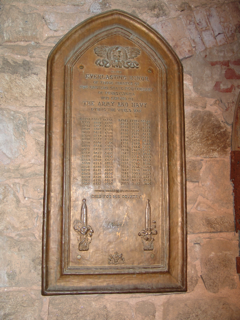
Given this background, we know that inmates in the Eastern State were passionate about helping out the soldiers indirectly, and given the excerpts in The Umpire we can assume that the Christian population in the Eastern State prayed and preached to God for American soldiers' lives and patriotism.
An Excerpt from The Umpire (February, 1918)
It is undoubtedly true that patriotism and Christian brotherhood are analogous. They seem to go hand in hand as it were. Men go into battle and give their lives for something higher than themselves, when duty to their country calls. Clearly it must be the "devotion of the spirit to something nobler, something greater than itself.” That is the reason why men, after they have been for a little while in America and go back for a visit to the old country, have a new light in their faces, the light that has kindled there in the country where they have seen some of their objects fulfilled. That is the light that shines from America. God grant that it may always shine, and that in many a humble hearth in quiet country churches the flames may be lighted by which this great light is kept alive.”
Here, the inmate compares patriotism and Christianity and highlights how these two beliefs are analogous. The "devotion of the spirit to something nobler" is a strong concept that guides both Christianity, service to neighbors, family, and loved ones, and patriotism, service to the nation. In times of war, people seek to believe strongly in the ideas of patriotism, especially patriotism and sacrifice rooted in Christian faith. The war encourages people to look out for solidarity and moral justification. Incarcerated people in the Eastern State valued unity and purpose, such as the collective effort to help out the soldiers in the battlefront. There is also moral justification, for fighting the evil and identifying themselves with the "good" side. Rather than thinking of the war as an event distant from their lives, the inmates actively helped out the war effort, and the Christian inmates spread their philosophical beliefs regarding the war and their religious commitments. In so, they seemed to ask God for forgiveness of their past sins through sacrificing their time and effort for the lives of the American soldiers in the warzone.
Citations
- Pennsylvania Historical and Museum Commission; Harrisburg, Pennsylvania; Bertillion Hand Books; Series: 15.52
- https://www.icclarion.org/History
- Will Dockets, 1841-1917; General Index to Registers' and Orphans' Court Records, 1840-1981; Author: Clarion County (Pennsylvania). Register of Wills
- https://www.easternstate.org/explore/exhibits/jewish-life-eastern-state
- https://commons.wikimedia.org/w/index.php?search=eastern+state+penitentiary+chapel&title=Special:MediaSearch&go=Go&type=image
- https://wwionline.org/wwi-online/articles/prisoners-make-good-front
